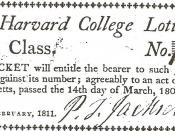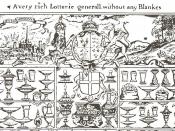Jackson's "The Lottery" as an Allegory Shirley Jackson's "The Lottery" is an excellent example of an allegorical short story. In this story, the reader learns of a town's "lottery" that takes place once a year, every year. It has been a tradition in this small rural town for many years and the villagers never question these activities, they just blindly go along with it. But what the reader doesn't know is just what kind of prize the winner is going to obtain. Jackson's use of symbolism is shown through the description of the characters, significant objects, and the actions in the story. These elements are used to represent the death that is associated with the lottery.
The first allegorical use is seen through the description of the characters. Everything about them is symbolic. For example the names of the characters suggest a certain meaning. Mr.
Summer's name suggests that he has become a man of leisure through his wealth. Also Mr. Graves' name is simply a foreshadow of the grave situation to come. The "victim" of the story, Tessie Hutchinson, rebels against the lottery by screaming at the end of the story, "It isn't fair, it isn't right." (238) The name Tessie can be associated with the word testy or tizzy. Which means someone who is in an angry or rebellious state. The name Warner can be seen as a literal warning against ceasing the tradition of the lottery. "Lottery in June, corn be heavy soon." (236) Mr. Warner says this after Mr. Adams speaks of a neighboring village who has given up the lottery.
The objects depicted in the story are another good representation of the death associated with the lottery. All of the blackness makes the reader think of death and evil. The...


